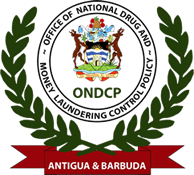The Office of National Drug and Money Laundering Control Policy (ONDCP) hosted the inaugural Anti-Money Laundering and Counter the Financing of Terrorism (AML/CFT) Strategic Implementation Planning Workshop during the period April 16th and 17th April 2014. This event was held at the Jolly Beach Hotel and represents an important step in Antigua and Barbuda’s ongoing efforts to meet international standards.

The Director of the ONDCP, Lt. Col. Edward Croft, in his welcome and introductory remarks highlighted the workshop’s objective of developing a strategic plan which would be used by the government and all stakeholders to determine a strategic approach to issues, remedy the AML/CFT weaknesses and develop effective plans to demonstrate that Antigua and Barbuda is a jurisdiction which is committed to AML/CFT issues and is a prudent country in which to invest and conduct business.
The focus of the workshop was to examine the status of the jurisdiction’s present compliance to the newly revised Financial Action Task Force (FATF) 40 Recommendations which places emphasis on technical compliance and effectiveness.
Ms. Paula Frederick-Hunte, Permanent Secretary within the Prime Minister’s Office, in her feature address expressed the Honourable Prime Minister’s views of this two day session as very important to Antigua and Barbuda’s development as the result will dictate our actions leading up to the FATF Fourth Round of Mutual Evaluations, for which Antigua and Barbuda will be evaluated in 2016. She charged the workshop to examine the status of the laws, regulations and other required measures which were in force and in effect and that examination was also to extend to the functional capacity of the supporting AML/CFT institutional framework and its effectiveness.
The workshop’s guest speaker, Ms. Karen Hughes, Parliamentary Counsel within the Ministry of Justice and Legal Affairs of St. Kitts and Nevis enlightened the participants on her country’s experience in undertaking a Strategic Implementation Programme and shared lessons learnt.
Presentations were also made on Antigua and Barbuda’s present AML/CFT systems and countermeasures in light of the Legal; Law Enforcement; Supervisory and Regulatory; and National and International Co-operation framework.
Money Laundering and Terrorist Financing is a national responsibility and recognizing the importance of the various stakeholders the workshop included participants from the relevant competent authorities. These included The ONDCP, The Financial Services Regulatory Commission, The Royal Police Force of Antigua and Barbuda, Antigua and Barbuda Defence Force, The Banking Association, Members of the AML/CFT Oversight Committee, Ministry of Finance, Ministry of Legal Affairs, Customs and Excise Division, Intellectual Property and Commerce Office, and the Immigration Department.
During the FATF Plenary in February 2014, The FATF recognized and indicated that Antigua and Barbuda was no longer subject to specific monitoring by the International Cooperation Review Group (ICRG) since it made significant progress on AML/CFT matters, meeting all its Action Plan items by December 2013.
One of the first requirements of the new or revised FATF 40 Recommendations is the need to demonstrate that a National Risk Assessment was undertaken. It is the goal, that this workshop will steer the jurisdiction in the direction of conducting a National Risk Assessment. It was also noted that a proposal for the conduct of a National Risk Assessment was submitted to Cabinet for its consideration.
The Director of the ONDCP expresses thanks for the assistance and guidance of the Caribbean Financial Action task Force in the conduct of this workshop. Appreciation was also expressed to the Prime Minister and the Government for their commitment and undertaking which have resulted in the removal of Antigua and Barbuda from the list of jurisdictions with strategic AML/CFT deficiencies and have paved the way for the conduct of the workshop.
The ONDCP looks forward to the greater collaboration between the Government, the AML/CFT Supervisory Authority, Regulators and Reporting Entities during the process and development of the Strategic Implementation Plan.
One of the important outcomes resulting from the workshop is the need for continuous interaction between the regulators, supervisors and the reporting entities.

